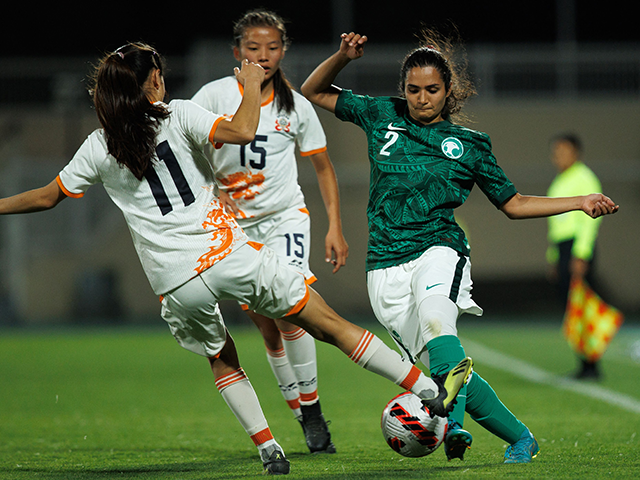Reports circulating this week that Visit Saudi, the official tourism board of Saudi Arabia, would sponsor the 2023 FIFA Women’s World Cup prompted an eruption of outrage in the soccer world and a loud protest on Wednesday by host nations Australia and New Zealand that they were not involved in the approval process.
The sports website the Athletic reported on Monday that FIFA, the international soccer association that organizes both the men’s and women’s World Cup tournaments, was preparing a formal announcement that it had secured a lucrative sponsorship from the Saudi government for its tourism promotion operation. The Kingdom of Saudi Arabia, an Islamist theocracy, is one of the world’s most repressive regimes and has a particularly heinous record of human rights abuses against women. The regime did not allow women to even attend soccer games at stadiums prior to 2017 and continued to impose a rigid “guardianship” system that prevents women from exercising many basic rights and deprives them of critical rights in marriage and custody disputes.
Saudi Arabia also routinely arrests women for any public statements considered inconsistent with the agenda and ideology of the government. In one such recent case, a terrorism court sentenced Salma al-Shehab to 34 years in prison in August for publishing retweets on her Twitter account urging Riyadh to free imprisoned women’s rights activists. al-Shehab was found guilty of attempting to “create public turmoil and destabilize civil and national security.
The Saudi sponsorship was reportedly part of FIFA adopting a “new commercial strategy” to facilitate sponsorship for its women’s events directly. FIFA head Gianni Infantino has publicly complained of the discrepancy in profits between men’s and women’s soccer in the past and expressed a desire to lift the profile of the latter.
“Broadcasters offer us 100 times less than what they offer us for the men’s World Cup,” Infantino lamented in October. “The next World Cup will cost us around $400 million and we hope to break even.”
Visit Saudi does not appear as a sponsor of the 2023 World Cup on FIFA’s website at press time.
The host nations of next year’s women’s tournament, Australia and New Zealand, sent a letter to FIFA on Wednesday to attempt an urgent “clarification” regarding reports that Saudi Arabia would be funding the event.
“We write to express our serious disappointment and concern at the news of the apparent appointment of Visit Saudi as a sponsor,” representatives of both governments wrote to FIFA, according to the Associated Press, which obtained the letter. “We cannot express strongly enough the potential repercussions and fallout that could result of this decision.”
“Australia and New Zealand, both as sovereign nations and as football associations, have for decades placed the utmost importance on gender equality, and have sought to promote these ideals around the world,” the letter asserted.
The Associated Press called the contents of the letter “unprecedented” in the relationship between FIFA and host nations.
Women’s rights activists and prominent members of the soccer community have also expressed disgust at the reported sponsorship.
“Saudi Arabia sponsoring a global women’s sporting event is like Exxon sponsoring COP28 or McDonald’s a healthy eating or anti-obesity symposium,” Craig Foster, a former captain of Australia’s men’s soccer team, said in a statement published by the left-wing New York Times.
COP28, the United Nations climate change alarmism conference, will take place in the United Arab Emirates (UAE) this year and be organized by Sultan al-Jaber, the head of that country’s state oil company.
FIFA has yet to comment on the controversy at press time. The organization has invested heavily, however, in ties to Saudi Arabia elsewhere, particularly in developing women’s soccer in that country. Saudi Arabia, as part of a series of reforms by Crown Prince Mohammed bin Salman, first let women attend soccer games in 2017, a year before it allowed them to drive. By last month, FIFA was touting the development of a successful soccer league for women in the country.
“Women’s football in Saudi Arabia has taken another significant step forward with the successful staging and completion of the country’s first nationwide league,” FIFA announced on January 12, applauding the country’s “wider strategy for women’s football in Saudi Arabia that also includes the development of coaches, referees and players and the creation of a women’s national team.”
The crown prince – who has pioneered a series of lucrative reforms to Saudi Arabia’s fundamentalist Sharia-based laws since assuming the title under his father, King Salman, in 2017 – was also a prominent VIP celebrity at November’s FIFA Men’s World Cup, held in neighboring Qatar. Bin Salman used the visit to restore the image of Saudi-Qatari ties, damaged for years in a prolonged dispute over Doha’s close relationship with Saudi Arabia’s greatest geopolitical rival, Iran. Mohammed bin Salman posed for photos with the emir of Qatar, Sheikh Tamim bin Hamad, and the emir was later photographed waving a Saudi flag and cheering for the neighboring team.
The 2022 Qatar World Cup was a human rights disaster. Thousands of laborers are believed to have died building stadiums and other facilities for the tournament. Qatari officials only admitted to up to 500 deaths, and only halfway through the tournament. Three journalists – American Grant Wahl, British producer Roger Pearce, and Qatari photographer Khalid al-Misslam – died while covering the event. Journalists documented multiple instances of Qatari officials manhandling and otherwise abusing attendees of the tournament.
Follow Frances Martel on Facebook and Twitter.

COMMENTS
Please let us know if you're having issues with commenting.